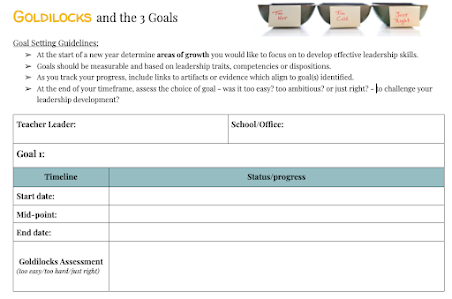Goldilocks and the 3 Goals:
Merging reflective practice with goal setting for learning leaders
Sandy Cameli, EdD
Who doesn't remember the children's story of "Goldilocks and the 3 Bears"? And, while breaking and entering was not the original lesson to unpack, the storyline focused largely on Goldilocks' porridge choices: too hot, too cool or just right. How many of us have been stuck with similar dilemmas? (minus the bears, of course!) How do we make wise choices when presented with multiple options? Do pros & cons factor into our decision making? Is rolling the dice an acceptable strategy (as long as gambling is not involved)? or, Do learning leaders employ reflective practices to assess their own readiness before moving forward?
Goal setting is a common and effective practice incorporated into leading, learning and living on a daily basis. Corporate executives set annual revenue-based goals; Educators set attendance and academic targets for their students each year; and, members of society aim to stop bad habits and set new goals after a glittery ball drops each New Year's Eve. But how many goal-getters try a goal on for size to determine its fit? Might this intended target be: "too easy", "too ambitious", or "just the right challenge for me at this point in time?"
Additionally, how does one routinely build reflection into their own rituals and routines while aiming to achieve said goals? For learning leaders seeking a strategy for goal setting and reflective practice, the "Goldilocks and the 3 Goals template" was developed to guide a lead learner through the process. Similar to other goal-setting models, targets and timelines need to be identified first. However, once started, and progress or status is collected, the leader can pause and reassess based on the Goldilocks scale: Too easy, Too Hard or Just Right. Reflection is key in determining the progress of the goals. If a goal appears to be on-track, then continue the journey. However, if commitments have waned or obstacles have prevented any reasonable progress, then perhaps pause, abandon or readjust the goals as needed. Ultimately, it is the individual's own initiative (and curiosity) that will determine the outcomes, expected or not. (No fairy tale crimes required!)


No comments:
Post a Comment